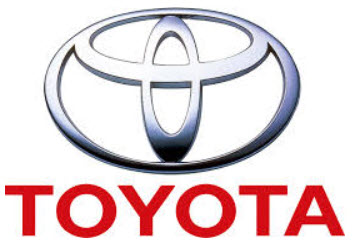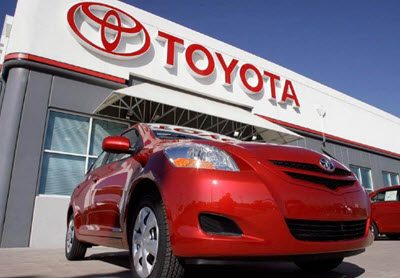| Traded as |
|
Toyota Motor Corporation is a Japanese multinational automotive manufacturer that is also active in the field of robotics. Toyota Motor Corporation is a part of the Toyota Group, one of the largest conglomerates in Japan.
Founded in the 1930s, Motor Corporation became the world’s largest automobile maker in 2008 when it displaced GM, and it has held on to that position ever since.
 Toyota Motor Corporation produces vehicles under five brands:
Toyota Motor Corporation produces vehicles under five brands:
- Toyota
- Hino
- Lexus
- Ranz
- Daihatsu
In 2012, Toyota Motor Corporation produced over 10 million vehicles – a feat not accomplished by any other automobile manufacturer in the world. This was also the year when Toyota Motor Corporation made its 200-millionth vehicle.
As of October 2016, Toyota Motor Corporation was the 5th largest company in the world by revenue.
In addition to being a dominating manufacturer of traditional motor vehicles, Toyota Motor Corporation is also an acknowledge forerunner in the field of hybrid motor vehicles. In January 2017, the cumulative global sales of Toyota and Lexus hybrid passengers car models reached the 10 million milestone, and Toyota is currently the world’s market leader in sales of hybrid electric vehicles. It is a leading force for mass-market adoption of hybrid vehicles worldwide, with its Prius family being the world’s top selling hybrid nameplate.
Ranking of TYO-listed Stocks by Market Capitalisation
Data from end of January 2018
| Rank | Code | Issue | Market Capitalisation \100mil. |
| 1 | 7203 | TOYOTA MOTOR CORPORATION | 244 072 |
| 2 | 8306 | Mitsubishi UFJ Financial Group,Inc. | 115 139 |
| 3 | 9437 | NTT DOCOMO, INC. | 105 463 |
| 4 | 9984 | SoftBank Group Corp. | 98 839 |
| 5 | 6861 | KEYENCE CORPORATION | 80 781 |
Short facts about Toyota Motor Corporation
| Japanese name | トヨタ自動車株式会社 |
| Transcribed name | Toyota Jidosha KK |
| English name | Toyota Motor Corporation |
| Corporation type | Public (K.K.) |
| Industry | Automotive |
| Key products | Automobiles
Luxury vehicles Commercial vehicles Engines |
| Production output | 10,466,451 in 2017 |
| Founded | August 28, 1937 |
| Founder | Kiichiro Toyoda |
| Headquarters | Toyota, Aichi, Japan |
| Area served | Worldwide |
| Traded as |
|
| International Securities Identification Number (ISIN) |
|
| Index inclusion |
|
| Revenue | ¥27.60 trillion(FY2017) |
| Operating income | ¥1.Japan Trustee Services Bank99 trillion (FY2017) |
| Net income | ¥1.93 trillion (FY2017) |
| Total assets | ¥48.75 trillion (FY2017) |
| Total equity | ¥18.18 trillion (FY2017) |
| Major shareholders in 2016 |
|
| Number of employees | 364,445 (2017) |
| Divisions |
Toyota Racing Development (TRD)
|
| Examples of subsidiaries | Japan
Daihatsu Toyota Financial Services Toyota Motor East Japan Hino (57.21%)
Abroad Toyota (GB) PLC Toyota Kirloskar India (89%) Toyota Motor Corporation Australia Toyota Motor Europe Toyota Motor Manufacturing France Toyota Motor Manufacturing UK Toyota Motor North America Toyota Motor Russia Toyota Motor Sales USA Toyota Pakistan Toyota South Africa Motors Toyota Motor Thailand(86.43%) Toyota Canada (51%) Toyota Peugeot Citroën Automobile Czech (50%) Perodua (25%) |
| Examples of stakes | Subaru Corporation (16.66%)
Isuzu (5.9%) |
| Examples of joint-ventures | GAC Toyota (in China)
Sichuan FAW Toyota Motor (in China) |
Toyota Motor Corporation
The company was founded by Kiichiro Toyoda in 1937 as a spinoff from his father’s automatic loom manufacturing company Toyota Industries. By then, Toyota Industries has already created its first engine and its first passenger car (the Toyota AA).
Toyota is famous for having developed and introduced many groundbreaking technologies to mass-market, such as Advanced Parking Guidance System, eight-speed automatic transmission, and four-speed electronically controlled automatic transmission with button for power and economy shifting.
Toyota has a large market share in the United States and is also a market leader in Australia. In Europe, its market share is considerably smaller. Toyota sells vehicles worldwide, and is for instance a major player in many African and South American countries. Through its Daihatsu subsidiary, Toyota has significant market shares in several fast-growing Southeast Asian markets.
Company strategy
 Toyota is famous for developing and implementing the concepts Lean Manufacturing and Just In Time Production. Today, Toyota’s managerial values and businesses methods are known collectively as The Toyota Way. Adopted in 2001, the Toyota Way 2011 is an expression of values and conduct guidelines applicable to all Toyota employees.
Toyota is famous for developing and implementing the concepts Lean Manufacturing and Just In Time Production. Today, Toyota’s managerial values and businesses methods are known collectively as The Toyota Way. Adopted in 2001, the Toyota Way 2011 is an expression of values and conduct guidelines applicable to all Toyota employees.
External analysts have boiled down the Toyota Way to the following components:
- Long-term thinking as a basis for management decisions
- A process for problem-solving
- Adding value to the organisation by developing its people
- Recognising that continuously solving root problems drives organisational learning
- The Toyota Way incorporates the Toyota Production System
Examples of nonautomotive activities
Robotics
Toyota has developed multitask robots intended for manufacturing, entertainment and the care of humans. In 2004, they garnered a lot of publicity by unveiling a trumpet-playing robot. Toyota also participated in the development of
Kirobo
Toyota created a voice recognition function for Kirobo, Japan’s first robot astronaut. Kirobo arrived to the International Space Station (ISS) in August 2013 to accompany Kichi Wakata, the Japanese ISS commander. Kirobo was developed as a collaborative effort between Dentsu, the University of Tokyo’s Research Center for Advanced Science and Technology, Toyota, Robo Garage, and JAXA (Japan Aerospace Exploration Agency).
Brain Machine Interface
The Brain Machine Interface is designed to make wheelchairs easier to operate for the user. Created by Toyota, this interface allows the user to control an electric wheelchair by thinking about how they want the chair to move. Using their own mind, the wheelchair user can make the chair go right, left and forward, and the delay between thought and movement is just 125 milliseconds.
Aerospace
Toyota is a minority shareholder in Mitsubishi Aircraft Corporation.
Toyota has also considered participating in general aviation market. In 2002, they contracted with Scaled Composites to produce the proof of concept aircraft TAA-1.
Biotech
Toyota continuously invests in promising start-up businesses in the biotechnology field. This is a few examples of ventures in which Toyota is involved:
Australian Afforestation Pty. Ltd
P.T. Toyota Bio Indonesia
Sichuan Toyota Nitan Development Co., Ltd (in China)
Toyota Roof Garden Corporation (in Japan)
Toyota Floritech Co., Ltd (in Japan)
Sewing machine technology
Toyota is the inventor of the free-motion embroidery sewing machine Oekaki Renaissance.

